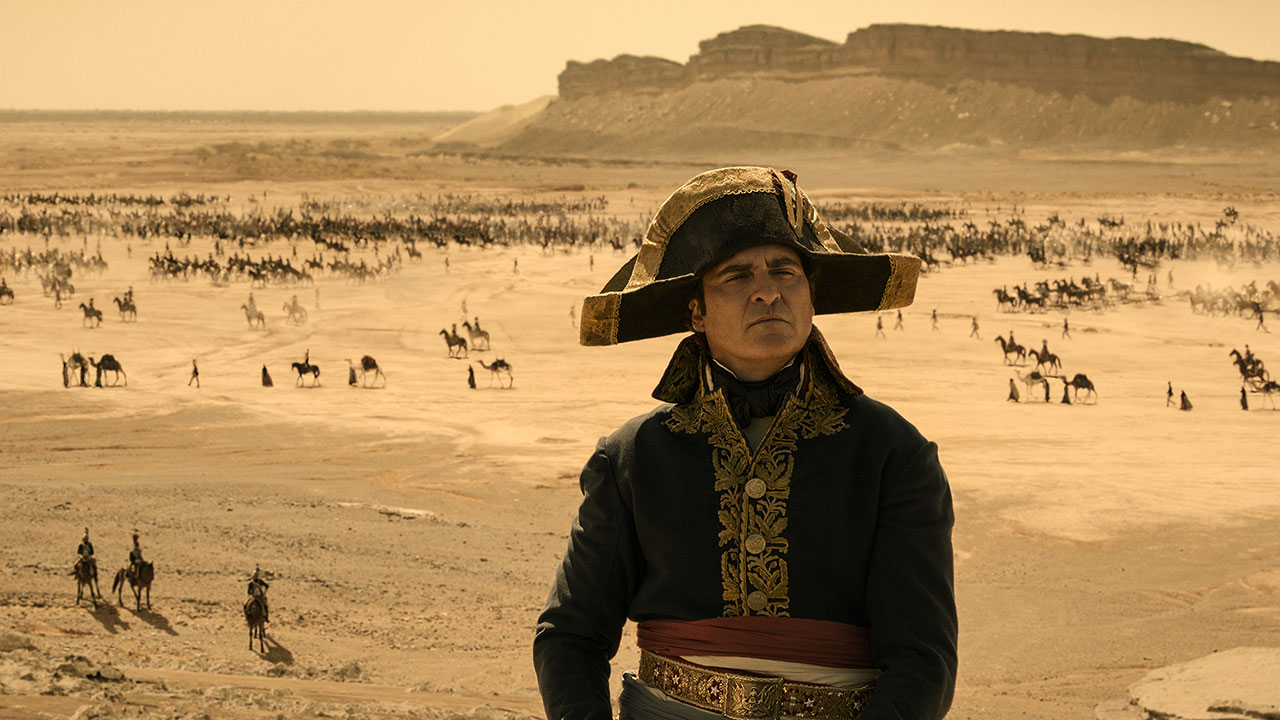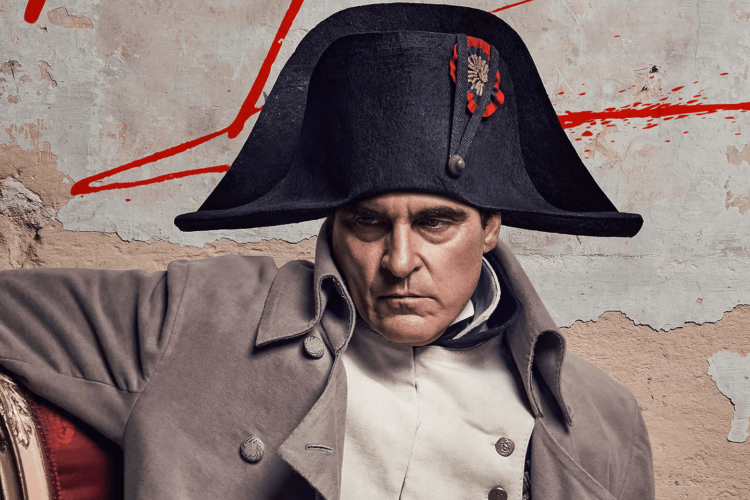Ridley Scott’s Napoleon succeeds precisely because it fumbles, for what better way to present the current state of Western man than as an absurdist going through the motions?
I acknowledge I am late to the party. But it took this long for the movie to digest (and for me to get the time to write this).
Oswald Spengler, author of The Decline of the West, once wrote that each age needs its own historian and its own portrayal of historical events. The Enlightenment had Edward Gibbon, who argued that the rational Roman Empire crumbled due to superstitious Christianity. The 19th century had GWF Hegel, who saw the hand of God in all human events, even the bloodiness of revolutionary terror and subsequent statist repression. (Presumably, Spengler thought of himself as the historian for the early 20th century, where history becomes a cycle in which reasonable civility reaches an apex and declines into a senile period that needs to be led by authoritarian strongmen, which he termed “Caesarism”—their forerunners being figures like Cecil Rhodes.)
Learn the benefits of becoming a Valuetainment Member and subscribe today!
Now it would seem that Ridley Scott (or perhaps an amorphous pop-belief Scott is drawing from that influences all our Boomer and Gen-Xer creators) is the historian of our age. For it is from Scott that we have been given a Napoleon—perhaps not the “real” Napoleon, but a Napoleon nonetheless—that more accurately than any production in recent times captures our current stage of life.

Napoleon by Ridley Scott is a two-and-a-half-hour biopic, with the camera fixed firmly on Emperor Napoleon Bonaparte as he drags himself through his own timeline. Beginning with him witnessing the beheading of Marie Antoinette, it loosely follows the key points of his life, breezing over his Italian campaigns and dwelling on the Battles of Austerlitz and Waterloo, and ending with his imprisonment on St. Helena.
The movie’s reception proceeded in three phases.
The first was perplexity. The first trailer with its lack of modern-day “pozzing” was just a straightforward display of Napoleonic greatness. “He came from nothing. He conquered everything” served as the trailer’s tagline, and it even had some cool remixed Radiohead to go with it.
How is Scott getting away with this? viewers thought. Could it be? The first Hollywood film to have completely departed from and overcome “The Great Awokening” influenza contracted circa 2014? The answer to our prayers!
But that reaction quickly gave way to a second reaction: consternation and fearful apprehension at the possibility that the movie would be an antihistorical demoralization session. By the time of the second trailer, many feared that Napoleon would be castrated in front of millions by Josephine, his utterly superior female love interest. Those who celebrated the first teaser came to fear that Napoleon’s cuckoldry would be highlighted to epic proportions while his sublime dimension, the Napoleon that said, “I saw myself founding a religion, marching into Asia riding an elephant, a turban on my head and in my hand the new Koran that I would have composed to suit my needs,” would be diminished—all the adventure and exoticism drained.
This was indicated by subsequent trailers and a storm of comments from Ridley Scott, which amounted to him telling liberal journalists not to “worry” about the movie fixating on the “Great Man Theory.”
The third reaction was, from my perspective, a quietness that followed the film’s release. Yes, the critics weighed in, and the left loved it while the conservatives hated it. But the film suffered at the box office and I believe that many skipped on seeing it precisely because of the perceived smear campaign against the French Emperor.
However, the film was not, in fact, a castration procedure. While Josephine does abuse the man, this mostly follows historical fact…and he abuses her in return, kicking the princess up out of the castle and replacing her with a younger, more obedient wife, Marie Louise, Duchess of Parma.

The blow that Scott deals to Napoleon—and by extension the Western imagination—is not a direct assault in a cringe 2015-era way. Rather, it is forcing a mirror in front of us to show what we are now. Scott doesn’t allow historical accuracy to have a say: Napoleon happens for him exactly as it would happen if he, or any one of us living today, became Napoleon.
Napoleon doesn’t do things in this movie; things happen to him.
Other people recommend that he become emperor. Other people advise that he have an heir. It is recommended that he divorce Josephine. When the Duke of Wellington comes to deliver his prison sentence, Bonaparte awkwardly commends his British breakfast first to avoid acknowledging what Wellington is about to say.
Napoleon is presented as an awkward absurdist, an adolescent who has found himself thrown onto the world stage and who must now follow it through to the end. He is a monkey in a suit, playing king.
The effect is a numbness, and also a mocking laughter at everything formal which then uncomfortably trails off. It is a rending of the tablecloth in the middle of dinner, to strike at the pomp and circumstance and reduce everyone to their true human selves—but at the cost of everything decorative and fine in humanity. In the same way, we could say the masters of suspicion like Darwin, Marx, and Freud may be correct about humanity’s true character…but will admitting this really bring us anything glorious?
It’s not that there is no exoticism or adventure in Scott’s Napoleon (there are glimpses of the new Koran) but it is merely gestured at, half-jokingly. Napoleon arrives in Egypt (which Scott stupidly represents by having Napoleon’s army shoot cannons at the pyramids, which never happened but was “a fast way of saying he took Egypt.”), and he asks to see a mummified Pharaoh. He stares at it blankly for a minute, suggesting that he’s contemplating death. But the scene comes to nothing. He snaps out of it and awkwardly marches on.

In another scene, he tells cheating Josephine to show herself out as he asserts the grand proportions of his historical significance, but in a way that mocks the very notion of destiny. “History has brought me this mutton chop,” he says unconvinced, waving his dinner around. He puffs up his chest, but has to add: Don’t worry, I’m joking.
Everything almost has the humor of Deadpool—which is fine for Deadpool, but why in Napoleon? The Deadpool-ian self-conscious meta-satire of a situation is featured in nearly every movie made now, and some elder Millennials at this point are incapable of getting through social situations without doing it.
But Scott’s Napoleon, at the same time, is perfect in that it reveals the state in which “Western man” presently finds himself. Does that make the movie “great”? Does that earn it five stars across the board? No…but it does make it a masterpiece of mediocrity.
We are all Napoleon. We are all liberals, we are all fascists, and somehow we are also all communists. We cycle through these positions, rolling ourselves like a boulder up one of those three hills for a bit, only to roll back down and up another… all while being sabotaged from afar, literally and poetically, by the Rothschilds off-screen.
And now, ye kings! they kindly draw your own;
All states, all things, all sovereigns they control,
And waft a loan ‘from Indus to the pole.’
The banker, broker, baron, brethren, speed
To aid these bankrupt tyrants in their need.
— Lord Byron, “The Age of Bronze,” XV
I don’t believe Scott knew he was doing this. Rather, the director was revealing something about himself. His Napoleon is himself. And we are all Scott. Scott’s masterstroke was an accident. But it was nevertheless a masterstroke. To capture not just the process of entropy we are engaged in, but the very feeling of being in its driver’s seat, is something I don’t believe many directors could have done on purpose even if they had set themselves the task.

But is the slide toward entropy guaranteed?
The Second Law of Thermodynamics seems to apply to everything in the universe…except, bizarrely, humans themselves.
A human can go from a lay-about, whose every last hope has been extinguished, to a machine of efficiency and conquest, based on a simple shift in ideas with no significant material additions. Perhaps it is not “humans” per se, but intelligence, complex life, that is capable of thwarting general disorder in this way.
Regardless, a different version of Napoleon could have been possible. With the same technology, we could have had the Napoleon who arrives with the new Koran, giving a new meaning to human suffering and redeeming it from all world-denying hopes.
But to do that, we would need a director capable of seeing a fourth, and larger, hill, and rolling up it to gaze beyond its precipice.
VT SCORE: 6/10
Shane Devine is a writer covering politics, economics, and culture for Valuetainment. Follow Shane on X (Twitter).



















Add comment